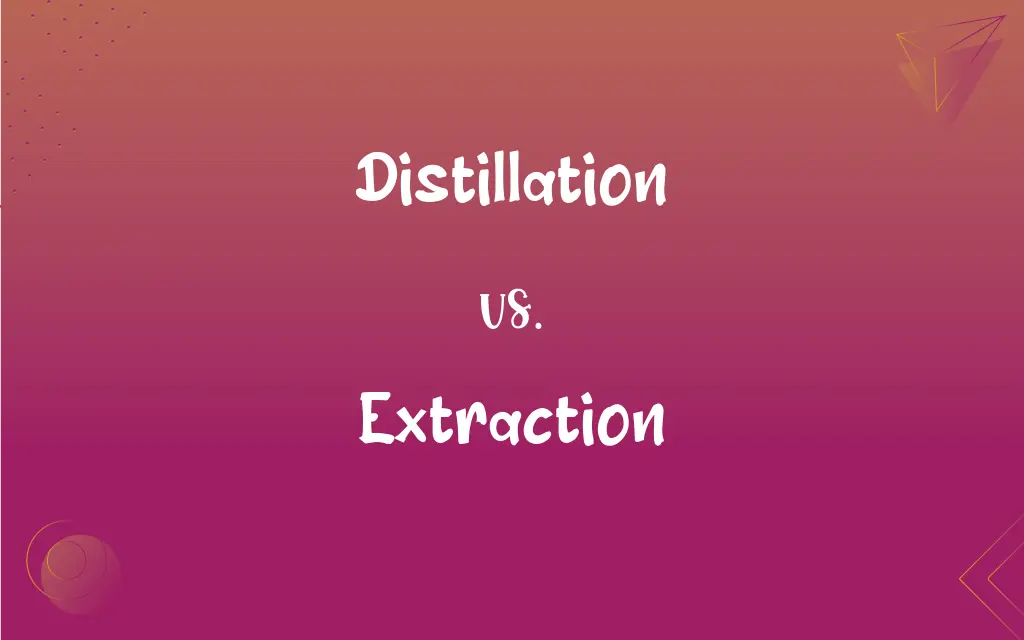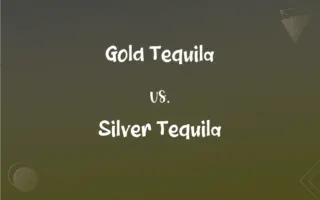Distillation vs. Extraction: What's the Difference?
Edited by Janet White || By Harlon Moss || Updated on October 18, 2023
Distillation separates substances based on their boiling points, while extraction isolates a substance using a solvent.

Key Differences
Distillation and extraction are both essential techniques in the field of chemistry, focusing on separating and purifying substances. Distillation relies on the differences in boiling points of substances. By heating a mixture, the component with the lowest boiling point evaporates first and is then condensed back into its liquid form, effectively separating it from the original mixture.
Extraction, meanwhile, is a process wherein a specific compound is separated from a mixture using a solvent. The principle is that certain substances are more soluble in particular solvents than others. By introducing a solvent to a mixture, one can dissolve and extract the target compound, separating it from the rest.
It's noteworthy to mention that while distillation is primarily a physical process, extraction can be both physical and chemical. This is because distillation doesn't alter the chemical nature of the substances, it merely separates them. In extraction, however, chemical reactions can sometimes occur between the solvent and the solute, potentially modifying the solute's chemical structure.
Furthermore, equipment and setup differ between distillation and extraction. Distillation usually requires heating equipment, condensation systems, and collecting flasks. On the other hand, extraction typically uses separating funnels and specific solvents suitable for the solute to be extracted.
Both distillation and extraction have diverse applications in various industries. Distillation is commonly used in the production of alcoholic beverages, water purification, and petroleum refining. Extraction finds its applications in making essential oils, extracting metals, and isolating compounds for pharmaceutical purposes.
ADVERTISEMENT
Comparison Chart
Basis of Separation
Boiling points of substances.
Solubility in a particular solvent.
Process Nature
Primarily physical.
Both physical and chemical.
Equipment Used
Heating equipment, condensation systems.
Separating funnels, specific solvents.
Applications
Alcoholic beverages, water purification, petroleum.
Essential oils, metal extraction, pharmaceuticals.
Alteration of Substance
Does not alter chemically.
Can sometimes alter chemically.
ADVERTISEMENT
Distillation and Extraction Definitions
Distillation
The evaporation and subsequent collection of a liquid by condensation.
Whiskey production involves the distillation of fermented grain mash.
Extraction
The action of removing a substance using a solvent.
The extraction of caffeine from coffee beans is a common process.
Distillation
Separation of components based on boiling points.
Distillation of crude oil yields various hydrocarbon products.
Extraction
A method to isolate a desired component from a mixture.
DNA extraction is essential in genetic testing.
Distillation
The purification of a liquid by heating and cooling.
The distillation of seawater produces fresh water.
Extraction
The process of obtaining something, especially from a mine.
Gold extraction from ores is a complex procedure.
Distillation
The extraction of essential oils from plants.
Lavender oil is obtained through steam distillation.
Extraction
Deriving something, especially by effort or force.
The dentist performed an extraction of the decayed tooth.
Distillation
A process of deriving the essence or spirit of something.
The novel is a distillation of the author's experiences.
Extraction
Drawing out or obtaining a principle, quality, or meaning.
The philosopher's work is an extraction of profound truths from ordinary events.
Distillation
The evaporation and subsequent collection of a liquid by condensation as a means of purification:the distillation of water.
Extraction
The act of extracting or the condition of being extracted.
Distillation
The extraction of the volatile components of a mixture by the condensation and collection of the vapors that are produced as the mixture is heated:petroleum distillation.
Extraction
Something obtained by extracting; an extract.
FAQs
What is the primary solvent used in extracting caffeine from coffee?
Common solvents include water, carbon dioxide, and organic solvents.
Does distillation always require heat?
Mostly, but there's cold or vacuum distillation which relies on reduced pressure.
Can distillation remove all impurities from water?
It removes most, but not all. Some substances may have similar boiling points as water.
Why is solvent choice crucial in extraction?
Because the efficiency of extraction depends on the solubility of the substance in the chosen solvent.
Are distillation and extraction environmentally friendly?
Depends on the methods and solvents. Some solvents are harmful, and distillation can consume much energy.
How is alcohol concentration increased in beverages?
Through distillation, as alcohol has a lower boiling point than water.
What's the difference between simple and fractional distillation?
Fractional has a column providing multiple vaporization-condensation cycles, refining separation.
Why don't we drink distilled water regularly?
It lacks minerals, and continuous consumption might not be beneficial for health.
Is extraction vital in cooking?
Absolutely, as in vanilla extraction or making herbal infusions.
Can distillation separate compounds with close boiling points?
It can be challenging; fractional distillation might be needed.
Can extraction be a continuous process?
Yes, there are continuous extraction methods in industrial applications.
Is solvent extraction always liquid-liquid?
No, it can also be solid-liquid, as in coffee brewing.
Can distillation be used for gas mixtures?
Yes, as in the separation of air into oxygen and nitrogen.
Are distillation and extraction used only in chemistry?
No, they're also used in industries like food, beverages, pharmaceuticals, and more.
Is extraction used in perfume making?
Yes, to obtain essential oils and aromatic compounds from plants.
What's steam distillation?
A method using steam to extract volatile compounds without decomposing them.
Are there any dangers in distillation?
Yes, like overheating, explosive vapors, or using inappropriate equipment.
Is supercritical fluid extraction a type of extraction?
Yes, it uses supercritical fluids, often CO2, as the solvent.
How does one choose between distillation and extraction?
It depends on the mixture's components, their properties, and the desired outcome.
Can extraction yield pure compounds?
Often, further purification, like distillation, might be needed post-extraction.
About Author
Written by
Harlon MossHarlon is a seasoned quality moderator and accomplished content writer for Difference Wiki. An alumnus of the prestigious University of California, he earned his degree in Computer Science. Leveraging his academic background, Harlon brings a meticulous and informed perspective to his work, ensuring content accuracy and excellence.
Edited by
Janet WhiteJanet White has been an esteemed writer and blogger for Difference Wiki. Holding a Master's degree in Science and Medical Journalism from the prestigious Boston University, she has consistently demonstrated her expertise and passion for her field. When she's not immersed in her work, Janet relishes her time exercising, delving into a good book, and cherishing moments with friends and family.
































































